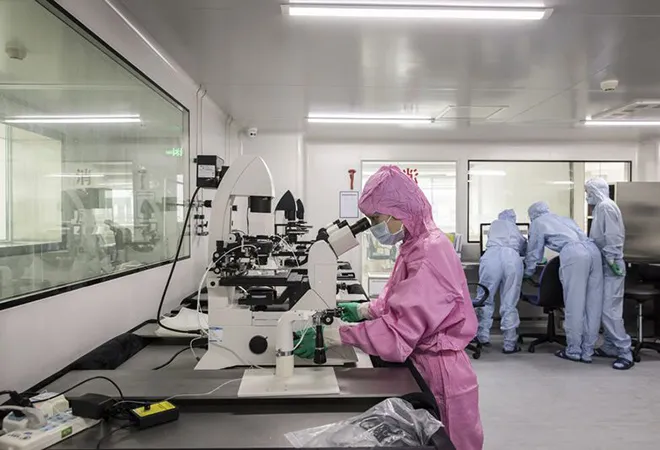Espionage, the world’s second oldest profession, has long been a central tool of statecraft. In the post-war era, however, where countries have revised national priorities to defend their technological and economic prowess, espionage has evolved to obtain new kinds of information. Economic espionage refers to targeting or acquiring of trade secrets to benefit any foreign government, or any foreign company. With the help of this information, foreign entities can either reduce or simply leapfrog research and development costs, and capitalize on new technology to boost their country’s economy.
Economic espionage and theft of trade secrets is a crime in the U.S. under the
1996 Economic Espionage Act. The objective of the statute makes a clear connection between the “economic health and security” of the United States and the protection of intellectual property and trade secrets. The Act anchors Washington’s commitment to guarding innovation, technology and scientific advancements – a key component to securing US’ eponymous role as the global superpower.
For long, Washington has accused China of being the largest perpetrator of economic espionage and intellectual property theft in its region. Using these as tools to “rob, replicate and replace” American technology, a clever ploy has been setup to support China’s strategic goals – such as, Made in China 2025 – to promote domestic manufacturing in next generation technology and conquer global markets. For instance, in 2018 a state-owned Chinese company was
accused of stealing dynamic random-access memory (DRAM) technology from a U.S. semi-conductor company, Micron, at a time when U.S. was a market leader in the technology.
According to the U.S. Department of Justice (DoJ), China is involved in more than
90% and 67% of economic espionage and trade secrets theft cases, respectively. While estimates vary, this causes the American economy an annual loss of roughly
$320 billion. These numbers make for a compelling case against Beijing, and come at a time when geopolitical, technological and economic rivalry has reached new heights between the U.S. and China.
Non-traditional spies as culprits
In many of these investigations, however, what is peculiar to observe is that the individuals who are indicted are not traditional spies and include students and members of academia, such as scientists, professors and researchers. Many are of Asian heritage, while some are American participants of talent recruitment programs and Chinese academic collaborations.
The U.S. takes pride in its open and collaborative academic environment; it acknowledges the contribution of more than
1.4 million international students and professors in producing advanced research, cutting-edge technology, and insightful scholarship. However, a Federal Bureau of Investigation (FBI)
primer outlines how Beijing exploits America’s free market economy and open society. Professors, students and scientists, wittingly or unwittingly, serve as “non-traditional collectors” of economic, scientific, and technological intelligence. By offering attractive incentives, they are often enrolled in Chinese research partnerships and academic talent recruitment programs, such as the
Thousand Talents Plan.
Washington has established a robust institutional mechanism to tackle such cases. In 2010, the FBI’s Counterintelligence division set up
the economic espionage unit to prosecute cases under the EEA. In November 2018, the U.S. Department of Justice setup a new
China Initiative to pursue high priority Chinese economic espionage and trade secret cases, in keeping with the nation’s strategic priority of countering national security threats.
Resultantly, there has been a crackdown on such transgressions. Scientists, researchers and students – of both Asian heritage and otherwise – have been indicted on charges of stealing
wind turbine technology, chemical formulations for
bisphenol-A-free (BPA-free),
film bulk acoustic resonator (FBAR) technology, and even,
genetically modified rice with biopharmaceutical properties.
In addition to this, lesser charges, such as making false statements, and mail or wire fraud can also lead to legal action. In January 2020, Harvard University Professor Charles Lieber – a prominent chemist and nanotechnology pioneer – was
arrested for making false statements about his involvement with China’s Thousand Talents Plan and the Wuhan University of Technology. Lieber’s research group at Harvard received funding from the U.S. National Institutes of Health (NIH) and the Department of Defense (DOD), both of which required full disclosure of all foreign collaboration and research support.
Before Lieber, a
Los Alamos National Laboratory physicist (New Mexico) and
six employees from the Moffitt Cancer Center (Florida) have faced similar charges.
The U.S. claims that talent recruitment plans, such as the Thousand Talents Plan, encourage the transfer for original ideas and intellectual property, and may result in violation of U.S. laws, including economic espionage. The message from Washington is clear: if Beijing will use covert methods to achieve its strategic goals, the U.S. will not hold back in combating the same.
On the flipside, Washington’s rhetoric and its methods in prosecuting cases have come under increasing scrutiny for a variety of reasons. Apart from having larger implications such as chilling academic freedom and inhibiting international research collaboration, existing data points towards racial bias against those of Asian heritage.
What’s the flipside?
A
2018 research paper by Mr. Andrew Chongsheh Kim conducted an empirical analysis of 136 economic espionage cases between 1997 and 2015. It found that Chinese and other Asian-Americans are disproportionately charged under the Economic Espionage Act, receive much longer sentences, and are significantly more likely to be innocent than defendants of other races. The permanent damage done to academic reputation of Asian Americans, who were eventually acquitted of charges, has been grave. The possibility of facing liability for making false statements, such as in Lieber’s case, is also fraught with complications. Often, the person being investigated does not have enough clarity on the breadth and nature of conduct that can give rise to liability.
Apart from the US, no other country has such a rigorous mechanism to tackle economic espionage. Economic espionage is treated as a crime in Canada and New Zealand only, while most nations treat it as a civil offence. This is perhaps directly related to Washington’s unique role in spearheading innovation and cutting edge research, and its traditional position on the strict enforcement of intellectual property rights.
The approach of other countries on Chinese funding and collaboration also differs. The EU’s flagship research programme, Horizon 2020, does not require researchers to disclose support from foreign resources, neither when applying for a grant, nor when they receive one. The EU has even undertaken
research to evaluate the openness of Chinese talent recruitment programs to skilled international migrants, and recommended measures to improve it. This indicates an open approach towards foreign collaboration and funding, which it considers as a supplement to domestic research enterprises.
There are divergent narratives around Chinese talent recruitment programs, such as the Thousand Talents Plan. The US views it as a sinister ploy to recruit scholars to research and innovate for China, by offering competitive salaries, state-of-the art research facilities, and honorific titles. Yang and Marino, on the other hand, in a 2019
article argue that such programs have been helpful in reversing “brain drain” – a common problem faced by developing countries – by attracting oversees Chinese talent back to their homeland.
The biggest impact of indicting Asian and non-Asian scholars for their connection to China, will perhaps be faced by Chinese students pursuing higher studies in America. As per numbers from the U.S. Department of Homeland Security, out of the 800,000 international students enrolled in higher education, more than
200,000 come from China. However, given the concerns surrounding students in STEM (science, technology, engineering and mathematics) courses, in 2018 the US
shortened the duration of visas for Chinese graduate students in aviation, robotics and high-end manufacturing. Consequently, in June 2019, China’s Ministry of Education issued a
statement urging its scholars and students to “raise its risk assessment” of U.S. study programs due to visa problems. International students generate
$39 billion in annual revenues for the U.S. education sector, which is now the country’s fifth largest services export. Should Beijing attempt to dissuade Chinese students from studying in the US, universities may stand to lose on future enrolments.
These developments have created a tense atmosphere on US university campuses. Some, such as the University of California Berkeley have sent
open letters to students to show solidarity, support and assistance. There is, thus, a real concern that the current activities of the Trump administration will lead to possible decline in Chinese students and scholars, and stifle academic collaboration and research.
Conclusion
The trade war, the Huawei ban, and now, the targeting of non-traditional collectors in economic espionage cases, have become pawns in today’s great game between the US and China. With the ongoing battle for geopolitical, economic and technological dominance, it may be useful to evaluate whom its fallout will impact the most.
The fear around China’s troubling behavior – from its aggressive foreign policy, to its methods to gain and acquire technology – is not entirely unfounded. However, Washington’s methods to tackle the problem of economic espionage could have long-term implications for the movement of professionals, academics, innovation, technology and knowledge. Further, the possibility of racial bias in investigations strikes at the very heart of what US claims to preserve - that is, freedom, democracy and a rules-based order. Given the importance of knowledge sharing and global scientific enterprise, for the rest of the world, it is critical to insulate this sector from the blowback of the ongoing geopolitical rivalry between the US and China.
The views expressed above belong to the author(s). ORF research and analyses now available on Telegram! Click here to access our curated content — blogs, longforms and interviews.




 PREV
PREV



